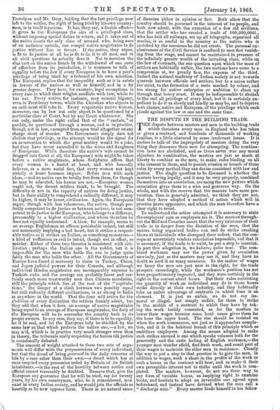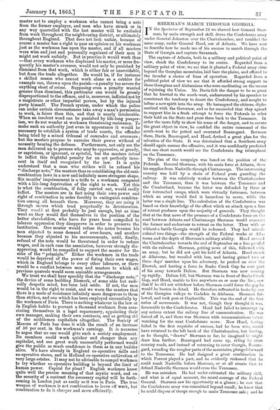THE DISPUTE IN THE BUILDING TRADE.
THE dispute between masters and men in the building trade which threatens every man in England who has taken or given a contract, and hundreds of thousands of working families, is a little obscured by some irrelevant issues. It is useless to talk of the impropriety of masters doing the very thing they denounce their men for attempting. The combina- tion laws are abolished, and as there never was any moral objection to combination, the masters are just as much at liberty to combine as the men, to make rules binding on all who consent to them, and to punish evasion or breach of those rules by every method they can devise consistent with law and justice. The single question to be discussed is whether the masters having legally, and it may be very properly, combined themselves into an association, are using the new powers which association gives them in a wise and generous way. On the whole, and with the reserve that the masters have more pro- vocation than is generally admitted, we think they are not, that they have adopted a method of action which will in practice prove oppressive, and which the men therefore have a clear right to resist.
To understand the action attempted it is necessary to state the employers' case as employers see it. The masters through- out the Midland Counties assert that the very existence of their trade is in danger from the dictation of the men, that the unions being organized bodies can and do strike crushing blows at individuals who disregard their orders, that the con- sequent uncertainty renders calculation impossible, and that it is necessary, if the trade is to exist, to put a stop to coercion. In part this allegation is, we believe, quite true. The com- bined workmen may use the power given by association unwisely, just as the masters may use it, and they have no doubt so used it on many occasions. In the matter of wages we fancy the men are just now in the right, for the trade prospers exceedingly, while the workmen's position has not been proportionately improved, and they were certainly in the right in the contest about hours. But their rules restricting the quantity of work an individual may do in those hours strike directly at their own industry, and they habitually take an unfair advantage of contracts in which time is an element. It is just as unfair, we do not say im- moral or illegal, but simply unfair, for them to strike in the middle of a contract to which they have by tak- ing the work tacitly consented, as for the masters to lower their wages because some local cause gives them for the hour the upper hand. The rise should be insisted on when the work commences, not just as it approaches comple- tion, and it is the habitual breach of this principle which so embitters employers. Among the means adopted to make such strikes succeed is one which speaks volumes both for the generosity and the caste feeling of English workmen,—the younger men wander afield, find fresh work, and remit part of their wages to maintain the elder men in resistance. Clearly the way to put a stop to that practice is to give the men, in addition to wages, such a share in the profits of the work or such a bonus as the contract will bear, and so make it their own perceptible interest not to strike until the work is com- pleted. The masters, however, do not see their way, to any form of variable bonus, as implying right to examine books, and hesitate to adopt an invariable one agreed upon beforehand, and instead have devised what the men call a "discharge note." Every master binds himself to his fellow master not to employ a workman who cannot bring a note from the former employer, and men who have struck or in any way quarrelled with the last master will be excluded from work throughout the neighbouring district, or ultimately throughout England. That does not look unfair, because of course a master has a right to pass an opinion on his workman just as the workman has upon the master, and if all masters were wise and just and personally cognizant of their men it might not work unfairly. But in practice it would work thus —that every workman who displeased his master, or more fre- quently his master's overseer, would not only be punished by dismissal from that work, which is either fair or unavoidable, but from the trade altogether. He would be, if for instance a skilled mason who cannot work alone as a cobbler for example can, thrown upon the parish—a penalty too severe for anything short of crime. Supposing even a penalty wanted greater than dismissal, this particular one would be grossly disproportioned to the offence, and is, moreover, inflicted not by a magistrate or other impartial person, but by the injured party himself. The French system, under which the police can under certain circumstances take away a man's permission to work, is fairer than this, and that is nearly intolerable. When an insolent word can be punished by life-long pauper- ism, we do not wonder at workmen threatening resistance. To make such an authority just even in appearance it would be necessary to establish a system of trade courts, the offender being tried by a mixed tribunal of comrades and overseers ; but the masters propose to exercise their power without of necessity hearing the defence. Furthermore, not only are the men delivered up to persons who may be oppressive, or greedy, or capricious, or ignorant, or spiteful, but the masters intend to inflict this frightful penalty for an act perfectly inno- cent in itself and recognized by the law. It is quite understood that a man who strikes will be refused his "discharge note," the masters thus re-establishing the old anti- combination laws in a new and infinitely more stringent shape. Six months' imprisonment is a trifle to a workman compared with a life-long deprivation of the right to work. Yet this is what the combination, if fully carried out, would really inflict. The masters are in fact using their own power and right of combination in order forcibly to extinguish combina- tion among all beneath them. Moreover, they are using it through means which tend perpetually to deterioration. They would at first probably be just enough, but as time went on they would find themselves in the position of the better slaveholders, who have for years been compelled to tolerate oppression they disapprove in order to preserve the institution. One master would refuse the notes because his men objected to some demand of over-hours, and another because they objected to his measurements, until, finally, refusal of the note would be threatened in order to reduce wages, and in each ease the association, however strongly dis- approving, would be compelled to support the master for the sake of the "principle." Either the workmen in the trade would be deprived of the power of fixing their own wages, which in England belongs to every other labourer, or there would be a conflict between men and masters to which all previous quarrels would seem amicable arrangements. We trust we shall hear speedily that the "discharge note," the device of some building Bismark, of some able but radi- cally despotic mind, has been laid aside. If not, the men would be in the right to resist, and we warn the masters that there is a mode of resistance infinitely more dangerous to them than strikes, and one which has been employed successfully by the workmen of Paris. There is nothing whatever in the law or in English habits to prevent a thousand workmen from asso- ciating themselves in a legal eoparcenery, appointing their own manager, making their own contracts, and so getting rid of the middlemen capitalists altogether. The Society of Masons of Paris has done it with the result of an increase of 50 per cent. in the workman's earnings. It is nonsense to argue that no one would give such a society employment. Its members could work quicker and cheaper than any capitalist, and one great work successfully performed would give the public as much confidence in them as in any builder alive. We have already in England co-operative mills and co-operative stores, and in Holland co-operative cultivation of very large estates. It may not be advisable to compel workmen to try whether co-operative building is beyond the limit of human power. Capital for plant? English workmen know quite well the precise meaning of that mystic word, and on the security of a contract the necessary capital will be forth- coming in London just as easily as it was in Paris. The true weapon of workmen is not combination to leave off work, but combination to do it cheaper and more efficiently.































 Previous page
Previous page